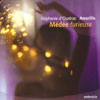Médée furieuse
The Medea myth in musical guises and a singer who can find all the drama
View record and artist detailsRecord and Artist Details
Composer or Director: Nicolas Bernier, Pierre Gautier de Marseille, Louis-Nicolas Clérambault, Jacques Duphly, Michel de La Barre, Jean-Baptiste Lully, Antonio Gianettini, Domenico Gabrielli
Genre:
Vocal
Label: Ambroisie
Magazine Review Date: 9/2008
Media Format: CD or Download
Media Runtime: 72
Mastering:
Stereo
Catalogue Number: AM157

Tracks:
| Composition | Artist Credit |
|---|---|
| Suite en trio |
Pierre Gautier de Marseille, Composer
Amarillis Pierre Gautier de Marseille, Composer |
| Médée |
Louis-Nicolas Clérambault, Composer
Amarillis Louis-Nicolas Clérambault, Composer Stéphanie d' Oustrac, Soprano |
| Premier livre de pièces de clavecin (et al), Movement: La Forqueray |
Jacques Duphly, Composer
Amarillis Jacques Duphly, Composer |
| Premier livre de pièces de clavecin (et al), Movement: Medée |
Jacques Duphly, Composer
Amarillis Jacques Duphly, Composer |
| Thésée |
Jean-Baptiste Lully, Composer
Amarillis Jean-Baptiste Lully, Composer Stéphanie d' Oustrac, Soprano |
| Medea in Atene |
Antonio Gianettini, Composer
Amarillis Antonio Gianettini, Composer Stéphanie d' Oustrac, Soprano |
| Balletti |
Domenico Gabrielli, Composer
Amarillis Domenico Gabrielli, Composer |
| Flute Pieces, Book 3 |
Michel de La Barre, Composer
Amarillis Michel de La Barre, Composer |
Author: Richard Lawrence
The main works here are the cantatas by two French contemporaries. Clérambault’s Médée was published in 1710. The singer sets the scene before becoming the sorceress herself: her husband Jason has abandoned her for another woman. In a series of recitatives and airs she ranges from love to fury. D’Oustrac shows herself to be a singer of great expressive power; but she overdoes the sliding up to the note, an effect where more definitely means less.
Bernier’s Médée was published seven years earlier. Like Clérambault’s version, it shows a strong Italian influence with its da capo airs and ornate instrumental writing. Again, d’Oustrac’s intonation is deliberately suspect. “Dépit mortel” from Lully’s Thésée – it’s now Theseus’s turn to become the object of Medea’s jealousy – is too short to make an impression but d’Oustrac finds the right note of regret in “Ah! faut-il me venger” before preparing to poison the ingrate.
What makes this disc really desirable is the glimpse of Gianettini’s Medea in Atene, first performed in Venice in 1675. The second of the three arias has Medea about to open a tomb: over a slow ostinato bass, d’Oustrac is faultless in pathos and intensity. Short instrumental pieces, neatly played by the four-strong Amarillis, are scattered throughout. An enjoyable programme.
Discover the world's largest classical music catalogue with Presto Music.

Gramophone Digital Club
- Digital Edition
- Digital Archive
- Reviews Database
- Full website access
From £8.75 / month
Subscribe
Gramophone Full Club
- Print Edition
- Digital Edition
- Digital Archive
- Reviews Database
- Full website access
From £11.00 / month
Subscribe
If you are a library, university or other organisation that would be interested in an institutional subscription to Gramophone please click here for further information.




